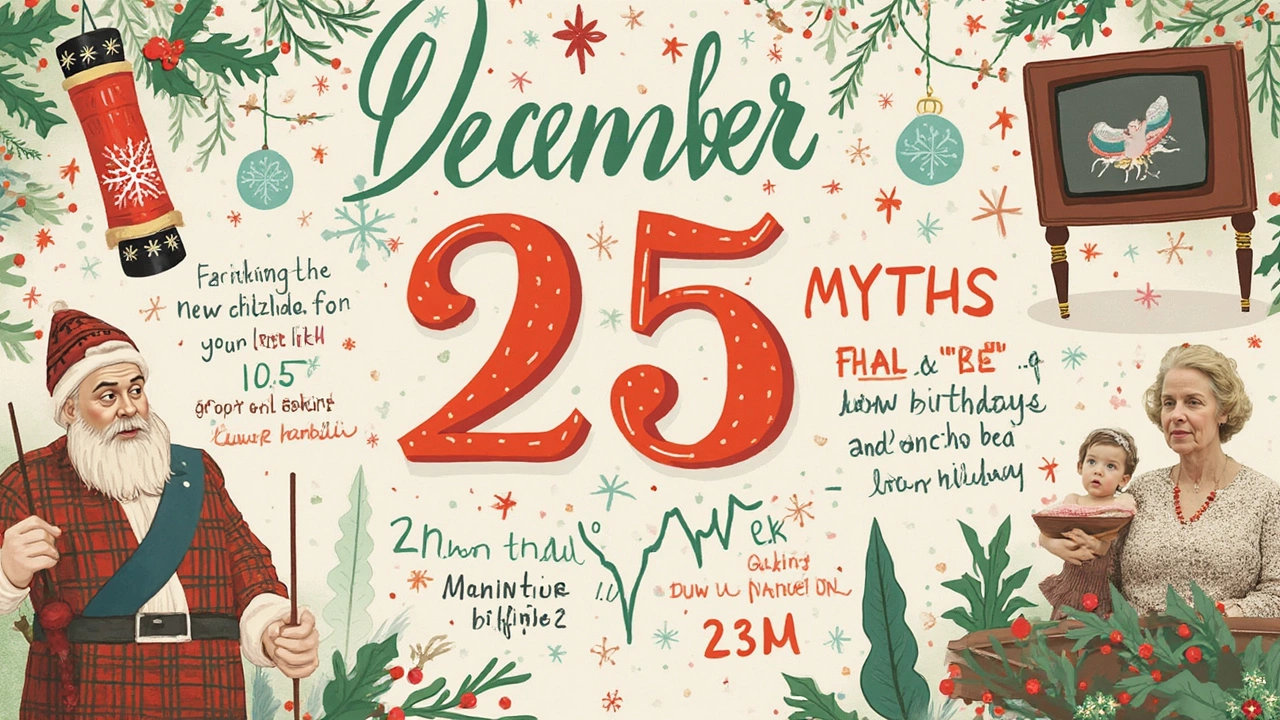Why is Christmas Birthday Rare?
 Jun, 14 2025
Jun, 14 2025
Imagine having to share your birthday with Christmas. Sounds fun, right? But here’s the reality: only a tiny fraction of people are actually born on December 25. Out of all 365 days, Christmas Day regularly shows up at the bottom of birthday charts — especially in countries where Christmas is a big deal.
Most hospitals report the lowest number of births on Christmas Day and New Year's Day. It isn’t because babies decide to wait for Santa; it’s mainly because scheduled births are almost never planned for these holidays. Doctors and nurses usually avoid elective c-sections or inductions on major holidays, so unless labor starts on its own, most December 25 arrivals are really just spontaneous.
- The Numbers Behind Christmas Birthdays
- Why December 25 Is So Uncommon
- Surprising Realities for Christmas Babies
- Making the Most of a Christmas Birthday
The Numbers Behind Christmas Birthdays
If you’ve ever wondered whether a Christmas birthday is really that rare, let’s get down to some numbers. In the U.S., studies like the one by the National Center for Health Statistics show that December 25 has the absolute lowest number of births out of all days in the year. The official birth rate on this date is usually less than half of what you’d find on a random day in September, which is when the most birthdays are reported.
Take a look at the daily averages: on a typical September day, about 12,000 babies are born in the U.S. On Christmas Day, it plummets to just around 6,500 newborns. This pattern repeats in countries like the UK, Australia, and Canada — places that also celebrate Christmas as a big national holiday.
Birthday data tends to show sharp dips on the big holidays. Not just Christmas, but also New Year’s Day and July 4th in the U.S. This is mostly because hospitals and doctors schedule far fewer elective procedures on these days. Statistically, December 25 lands dead last or second-to-last for most years on record, depending on which country you check.
One fun fact: If your birthday is December 25, you’re more likely to meet someone born on Leap Day (February 29) than you are to meet another Christmas baby. Fewer than 0.07% of all birthdays in the U.S. land on Christmas. So, yes, if you know someone with a Christmas birthday, they really are part of a pretty exclusive club.
Why December 25 Is So Uncommon
Here’s the truth: December 25 is almost at the very bottom when researchers sort birthdays by how often they happen. One big reason is how much hospitals slow down on major holidays. Elective births, meaning anything you can schedule like inductions or c-sections, nearly disappear on Christmas Day. Doctors and nurses want to be home with their own families, and no one schedules these things unless it’s medically urgent. So, if you’re not already in labor, you’re just not having that baby on Christmas if you can help it.
Natural births can still happen, but there are fewer of them, too. It ties back to pretty clear thinking: parents might not be trying for babies to be born right on *the* holiday, so conception trends tend to drop a little around late March and early April, which is when you’d need to get pregnant for a December 25 birthday.
Another interesting fact: Data from the CDC and several studies show December as one of the least common birth months in the U.S., with Christmas Day coming in last or second-to-last almost every year. Outside the U.S., this trend holds up in places where Christmas is important, but in countries where December 25 is just a regular day, the numbers look more normal. So, the holiday itself really does swirl things around.
It might sound like a small thing, but being born on a holiday that everyone else is celebrating for a different reason can cause some families to intentionally avoid it if they’re given a say. That’s why, even though it’s special, a Christmas birthday is such a rare club.

Surprising Realities for Christmas Babies
Having a Christmas birthday comes with some real quirks. Most people picture double gifts and festive parties, but ask someone who was actually born on December 25 and you’ll hear a different story. For starters, birthday parties almost never happen on the actual day—friends are traveling, families are busy, and restaurants might be closed or super crowded.
The data backs up the weirdness. In the U.S., December 25 is the least popular day for births, according to the CDC. There’s even a study from Harvard that found people born in late December are way less likely to have big birthday celebrations when they’re little, compared to folks with “normal” birthdays. In countries like the UK, things are about the same—Christmas babies are rare, and the ones who do share their day with the holiday often end up with joint birthday-Christmas gifts (which, let’s be honest, can feel like getting shortchanged).
Then there’s the struggle of making the day feel special. Stores are usually closed, and holiday family plans often push birthday traditions to the side. Many Christmas babies just pick another day to celebrate, usually a week or two before or after the holiday craziness. On the upside, some families really lean in, turning the whole week into a blended celebration—but that takes real effort and teamwork.
- The most important tip for anyone with a Christmas birthday: let friends and family know that a little extra effort goes a long way. Single-card combo “Merry Birthday” messages don’t cut it.
- Many Christmas births aren’t even recorded until a day or two later, since hospitals run on limited staff during holidays. This means some people technically celebrate on December 26, purely because paperwork got bumped.
- Psychologists note that Christmas birthdays can feel lonely for little kids, since birthday attention gets lost in the chaos of Santa and family traditions. Picking another day for a party is pretty common—and it works!
Bottom line? Being born on December 25 isn’t all bad, but it’s definitely not your average birthday. It takes some planning and creativity to make it feel as special as any other day.
Making the Most of a Christmas Birthday
If you (or your kid) were born on December 25, you already know—your birthday gets overshadowed. People are busy, most places are closed, and everyone’s caught up in Christmas plans. But don’t stress; with a little planning, you can turn a Christmas birthday into something special.
First up, don’t lump the birthday and Christmas together. According to data from the National Retail Federation, 68% of people with a Christmas birthday say they’ve gotten a “combo gift” at least once. That’s a birthday letdown. Keep gifts, songs, and cake separate from Santa and stockings. Even simple things like separate wrapping paper (skip the reindeer and go with balloons) make a difference.
Another smart move: celebrate early or late. Lots of Christmas babies pick an official birthday—usually a week before or after the 25th. This way, friends can actually come, bakeries are open, and you don’t get your day lost in the holiday noise.
- Ask family to set aside birthday time—like a special breakfast or night out, even if it’s just for a few hours.
- Let the birthday kid choose what they want to do, even if it’s just a movie marathon or snowball fight.
- Use tech. With so many folks traveling on the 25th, a quick birthday video chat can mean a lot.
Here’s a quick look at real numbers for Christmas birthdays in the US compared to other dates:
| Date | Average Births per Day |
|---|---|
| September 9 | 12,301 |
| July 7 | 11,915 |
| December 25 | 6,575 |
And let’s be real—stores are closed, so plan ahead. Grab treats, order cakes early, and warn friends your party won’t be on December 25.
Most of all, own that Christmas birthday. It’s rare—twice as rare as a leap day, if you check US birth data—and it comes with built-in sparkle. If you make your birthday traditions clear (and separate from the holiday craziness), you’ll actually get the best of both worlds.
